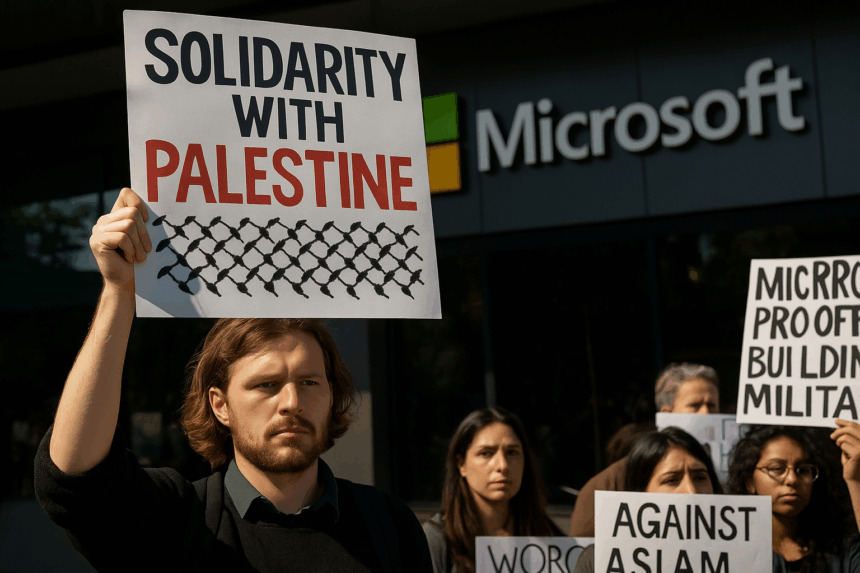Employees at Microsoft’s Redmond headquarters staged a sit-in over the company’s alleged role in supporting Israel’s military operations in Gaza. The protest, organised by the activist group No Azure for Genocide, called on the tech giant to end contracts tied to Israel. Moreover, they urged an investigation into the reported use of its Azure cloud services for surveillance.
What’s Happening & Why This Matters
Employees Push Back Against Azure Use
The protest saw dozens of current and former staff occupy part of the east campus in Redmond, Washington. They created what they called the “Free Zone.” Participants carried banners that read “Join The Worker Intifada – No Labour for Genocide” and “Martyred Palestinian Children’s Plaza.”
This action came just days after Microsoft announced an internal review into whether Azure and AI technologies had been used in surveillance activities against Palestinians. Earlier this year, protester Joe Lopez interrupted CEO Satya Nadella during a developer event and accused the company of complicity.
Firsthand Accounts from Organisers
Former employee Hossam Nasr, who previously held a vigil for Palestine outside company offices, said he escalated his protest after the killing of journalist Anas al-Sharif, reporting for Al Jazeera in Gaza. “He was intentionally targeted,” Nasr said. He also pointed to a joint investigation by The Guardian and +972 Magazine. It is alleged that Israel’s Unit 8200 used Microsoft’s cloud services to store mass surveillance data, including recordings of Palestinian phone calls.
Employee Nasreen Jaradat, still with Microsoft, added: “Every single second that we wait, things are worse and worse in Palestine. People are getting hungrier. More people are being bombed and maimed. It’s time for us to escalate, however we can.”
Microsoft’s Official Position
Microsoft has denied direct involvement. The company stated:
“We are not aware of the surveillance of civilians or collection of their cellphone conversations using Microsoft’s services. Based on reviews, including interviews and document assessments, we have found no evidence that Azure or AI technologies have been used to target or harm people in the conflict.”
Despite this stance, activists argue their presence has raised awareness among staff, sparking internal conversations about ethics, contracts, and corporate responsibility.
Wider Context and Reactions
The demonstration ended after two hours, when police warned participants they would face arrest for trespassing. While some employees expressed support, others felt the protest would not alter the company’s stance.
The event reflects a growing tech-worker movement challenging partnerships between leading tech firms and governments. Similar controversies have surfaced at Google, Amazon, and Meta over military and surveillance contracts. The issue adds pressure on Microsoft, which employs about 47,000 people in Redmond alone.
TF Summary: What’s Next
The Redmond protest highlights how Big Tech employees are pushing corporate accountability. While Microsoft says there is no evidence of Azure use in surveillance programs. However, internal dissent and external investigations keep the issue alive. Calls for divestment, transparency, and ethical reviews of contracts are expected to continue. More employees are questioning how their work impacts global conflicts.
— Text-to-Speech (TTS) provided by gspeech


